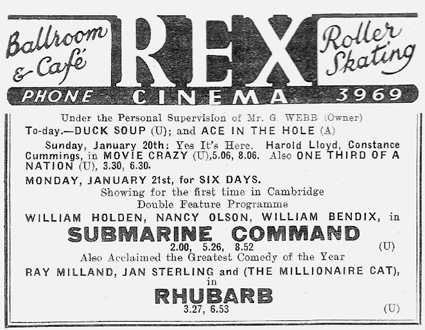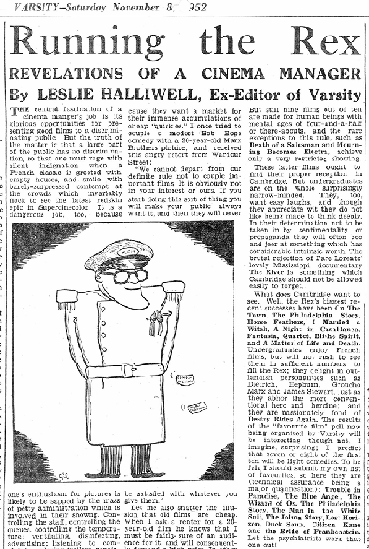 |
|
Halliwell attended St. Catharine’s College Cambridge from 1949 to 1952, reading English Literature. In addition to appearing on stage in several productions for the ‘Mummers’, he also contributed to Varsity, the student newspaper, rising to the position of editor in his final term. After graduating he spent a few unhappy months working for Picturegoer magazine in London before returning to Cambridge to manage the Rex Cinema, a dishevelled flea-pit whose programmes of golden oldies appealed to the local students. (Oh, and he was just coming up to his twenty-second birthday at the time of the first article.)
|
|
|
|
Articles: A Filmgoer’s Guide
|
This first one from early 1951 is most significant, being as the headline combines the titles of Halliwell's famous movie reference books... fourteen years before the first would be published. It also calls for a repertory cinema which would show older movies, something Halliwell would later make a reality in his role as manager of the Rex. |
 |
A FILMGOER’S GUIDE – by Leslie Halliwell Most of us accept the town’s cinemas casually as “somewhere to go after Hall.” Occasionally we complain to our friends of poor films, or long intervals, or the small child who sat behind us and breathed down our neck; sometimes we feel we would like to find the manager and murmur approval of a good programme or a novel advertising campaign. It seems worth while to try to sum up general opinion on the virtues and vices of the eight available cinemas. Five of them are controlled by the ABC circuit, but they are by no means of an even standard either in programmes or in presentation. The Regal has all the trappings of the modern super-cinema; it is comfortable to sit in, slick and reliable in presentation, and just the place to take visiting relatives. But what tawdry stuff it sometimes offers! Its rigidly-scheduled “circuit” programmes include the “biggest” films rather than the best, and they are too often supported by the poorest of second features. The Victoria, though a cramped and uncomfortable cinema, is run with imagination, and often surmounts the second-feature obstacle by using a good old film, preferably a comedy, to support the new one; during the last year it has presented revivals of “Movie Crazy,” “Thark” and “My Little Chickadee” before their general release. This term its programmes include “Manon,” “Bitter Rice” and some Chaplin revivals. |
The Central is a smart little cinema which receives third choice of the new films. This means that its programmes are often the most interesting, as it presents films which the distributors passed by as doubtful box office but which are better than those for which the publicity trumpets have blared. So last year the Central gave prominence to “Thieves’ Highway,” “The Reckless Moment” and “Intruder in the Dust.” Programme-planning at the Playhouse and Tivoli appears to be somewhat slapdash, and the cinemas are both unpleasing to the eye and inconveniently far away for most of us. But the Journey is often worth making, for although both cinemas thrive on “Zamba the Gorilla” and “The Tomahawk Trail,” they occasionally surprise us by putting on something more worth while. “The Contact. Man,” an ingenious variation of the Faust legend, and John Ford’s “Long Voyage Home2 were shown recently at the Playhouse, while the Tivoli was one of the first cinemas in the country to screen Max Ophuls’ neglected “Letter from an Unknown Woman,” and now proposes to show good foreign films from time to time. The Rex, a large but remote independent cinema, shows re-issues of light American films and its second-features are usually carefully chosen. The Kinema’s standards are uneven, but it frequently builds nip an excellent programme. The Arts is, of course, the Mecca of undergraduate filmgoers, and it is an institution we are grateful for. It is a joy to sit through a well-planned and carefully-timed programme without trailers, intervals, advertisements or interruptions of any kind. But critics have detected some lack of imagination in recent choices, especially of such English films as “Oliver Twist,” which have only just completed their tour of the circuits. The Arts can also afford to show fewer run-of-the-mill continental dramas such as “An Dela des Grilles” and more acknowledged classics from “The Cabinet of Dr. Caligari” to “Citizen Kane.” This term’s programme is its most interesting for some time. The serious filmgoer will, of course, belong to the Film Society, which presents excellent programmes at an astonishingly small charge. Those who have this term sat uncomfortable but uncomplaining in the Examination School Hall will, however, wish that the subscription might be sufficiently increased to allow all the performances to take place in the Central Cinema. For a town of its size, Cambridge is well served by its cinemas, but two improvements are possible: the addition of a news theatre, for which there is a regular demand, and of a repertory cinema on the lines of the London Classics, which present revivals of English-speaking productions which qualify not necessarily as great films but as undoubtedly good entertainment. |
We move on a year to find Halliwell rounding up the offerings of the local cinemas for the new term, and having a predictable whinge about the fare. Also reproduced, an advert for the Rex cinema. It is probable that Halliwell was at the time advising the owner, George Webb, on what films to show. Out of this relationship came the job which would realise one of Halliwell's dreams |
 |
Films For This Term, by Leslie Halliwell Bookings so far suggest that the five circuit cinemas will this term tread their conventional way, with consistently dreary second features and the very occasional box-office success which happens to be also a good film. Thus the Regal will show ‘A Place in the Sun’ and ‘Murder Inc.’, the Victoria ‘Detective Story’ and ‘High Treason’. Other noteworthy films which have slipped in somehow are ‘Donna Senza Nome’ (central), ‘Jour de Fete’ and ‘Four in a Jeep’ (Tivoli) and ‘Dr Jekyll and Mr Hyde’ (Playhouse). But, as usual, those who seek the most interesting and rewarding films will go to the independent cinemas. |
Of these, the Arts programme is more sombre than usual and less crowded with absolute masterpieces, but it includes Renoir’s unforgettable ‘Parite de Campagne’, Vigo’s surrealist ‘L’Atalante’ and the highly-praised comedy ‘Edouard et Caroline’; also, we are promised some vitage Disneys and no newsreel whoatsoever. The Rex plans an attractive series of English, American and French comedies, including ‘Mr Deeds Goes to Town’, ‘Night Train to Munich’, ‘It Happened One night’, ‘Adam’s Rib’, ‘The Private Life of Henry VIII’, ‘On the Town’, ‘Occcupy-Toi d’Amelie’ and some of the best films of the Marx Brothers and Bob Hope; it may be possible also to present ‘Things to Come’ and ‘Wuthering Heights’. The Kinema will show ‘All Quiet on the Western Front’, ‘Bonnie Prince Charlie’ and the original ‘Broadway Melody’ with Fred Astaire. Sunday programmes at the circuit cinemas will include ‘The Woman in White’, ‘Crossfire’ , ‘An Act of Murder’ and Raymond Chandler’s ‘The Blue Dahlia’. The Arts and the Rex, then, will have a good term. For the rest, it is a poor crop. If the local managers had a free hand we might fare better, but as it is the powers that be will rarely book foreign or ‘specialist’ films (unless they have an X certificate), and are obviously scared of revivals. A pity: there are many films which could still be good box office, now only collecting dust.
|
Next up is an example of Halliwell’s regular column in the paper, ‘Next week’s films’. It was here he refined his succinct summations of movies, something which would later characterise his reference books. On this occasion his style incurs the wrath of one particular reader... |
 |
Saturday, January 19, 1952 Next Week’s Films *Recommended. ARTS: René Clair’s *The Ghost Goes West, made in England in 1935. A whimsical fantasy about a millionaire tourist who buys a Scottish castle and takes it stone by stone to the States—family ghost and all. Technically it is surprisingly naive, but it is likeable for its witty script and an attractive dual performance by Robert Donat. Also a good Dis- ney, Mickey’s Trailer. Leslie Halliwell |
For some reason the above column enraged one reader, as the 'Letters to the Editor' page in the following edition showed: “Invective: Sir, - Seeing a new name at the foot of ‘Next Week’s Films,’ I read it hoping for a change from the superior carping of your previous “critic.” What unrewarded optimism! Once again we appear to be in for a weekly column drooling over anything continental or by the Marx Brothers, and sneering with a cocktail party type of wit at anything else. Let us glance at some of the week’s remarks by our dictator of taste: “neither pace nor style,” “does not convince,” “can be safely missed,” “hotch-potch,” “very silly,” “rambling and overlong,” “patchy,” “cheap,” “not good,” “wearisome,” “depressingly vile,” “gloomy.” A nice effusion and by no means unusual!
|
Leslie Halliwell writes: I fail to see a point in Mr Shearman’s letter; if I sincerely believe a film to be bad, it is hardly “superior carping” to say so. The column is intended as an acceptable guide for the majority of intelligent film-goers, and if space limits me to a single strong adjective, that should not be construed as a sneer.” |
A few months later and Halliwell really has the bit between his teeth: actually managing a cinema devoted to showing movies of an older vintage. He’s clearly in his element even though he tries to pursuade us it’s all too much at times... |
 |
Running the Rex THE central fascination of a cinema manger’s job is its glorious opportunities for presenting good films to a discriminating public. But the truth of the matter is that a large part of the public has no discrimination, so that one must rage with silent indignation when a French classic is greeted with empty houses, and smile with barely-surpressed contempt at the crowds which invariably flock to see the latest redskin epic in Supercinecolor. It is a dangerous job, too, because one’s enthusiasm for pictures is likely to be sapped by the mass of petty administration which is involved in their showng. Controlling the staff, controlling the queues, controlling the temperature; ventilating, disinfecting, advertising; listening to complaints, ordering trailers, repairing seats; keeping one eye on the box office, the other on the fire regulations; and even, in the name of Publicity, pretending to be King Kong. After a daily dose of these and other frenzied activities one’s taste becomes slightly jaded, and the films one has so carefully booked and arranged become a secondary consideration unless one of them turns out to be too long, too short, or in too bad a condition to show. Suppose the day’s work is more or less done and I settle down in the back row for a langorous half-hour with Dietrich or the divine Katie. The odds are two to one that I shall be jolted back to unromantic reality by the advent of a film traveler or two. Most of these gentlemen are rogues, but genial ones. |
|
Working on commission, they cheerfully present the unsuspecting manager with smiles, cigarettes, a natty line in sales talk, and a heap of atrocious films at high prices. But they do know when they are beaten. A recent conversation ran thus:
|
Return to Top |
|